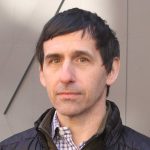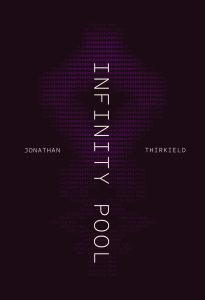Read an Interview with Poet Jonathan Thirkield, author of “Infinity Pool”
Continuing our series of interviews with the poets in our Phoenix Poets series, we’re happy to feature Jonathan Thirkield, whose new collection, Infinity Pool, publishes this month. Jonathan discusses a range or influences and methodologies that impact his work—from coding languages and AI to grief and chronic illness. He invites us into his ever-expanding relationship with poetry and offers insight into the elements of narrative, fantasy, body transformation, and language at play in Infinity Pool.
Tell us a little about yourself and your relationship to poetry.
Poetry is where I find myself most myself and most not myself. It’s where I become myself and find selves that I maybe only kind of knew were there. It is the place/space where I am language and language is me, and that language strives to reach out to others (those I know, those I imagine, those I hope exist, those who are gone but not gone because they are still here in language/mind).
In a broader sense, I find it impossible to disentangle our human embodied existence from the languages that mediate, define, and distribute us to each other. Nearly a decade after I started writing poetry (in late high school once Donne, Coleridge, and Hopkins entered my brain space), I began to immerse myself in coding languages. I was essentially self-taught in both cases—I took my first poetry writing class in my late twenties—and learned every coding language I know through books and professional projects.
For quite a while I kept these language spaces separate and parallel to each other: a human space and a machine space. The hyperformal structures of code definitely seeped into my first book which is inundated with control structures like sonnets, metrics, syllabics, and line-by-line character counts. But it wasn’t until I began teaching poetry in the 2010s that I really began to perceive, especially in my students’ work, how much code, data, and the interface were invisibly seeping into our bodies, consciousnesses, and how we related to each other and the world around us.
Over the past decade, I have dedicated my work to collapsing the boundaries between the poetics of human and machine languages—writing and designing interactive poems and poetic visualizations. I have been teaching the poetics of data, code, graphic design, interface, AI, and computational media as cultural forms that, much like poetry operate as formally complex and protean media for communication. My relationship to poetry—the poems I read, write, and teach—has become ever more expansive.
What’s something you’re particularly excited about with your new book? (Are you working in any experimental forms, does it depart from your previous work, etc?)
The work in this book is, at its core, about human life: what constitutes life, living, embodied, and disembodied humanity. It’s somewhat of a mirror image of my first book. The Waker’s Corridor was primarily about grief, loss, and speaking to the dead and through the past—about my father’s suicide when I was a child and the psychological/metaphysical landscapes that that loss constructed within me—and the variety of historical artifices (theater, architecture, and poetry) through which I could reinhabit those spaces. Infinity Pool is pitched toward the future—the multitude of imaged and possible futures we currently find ourselves inhabiting, along with, more personally, the many potential futures of my own children and my experience as a father over the first decade-plus of their lives. The landscapes that this book explores are the metaphysical spaces that have emerged across networked computers, interfaces, and the software constantly processing, recording, and flowing across them.
While I am always experimenting with/obsessing over form—the forms in this book are much less (intentionally) rigid/rigored than in the previous one. In Infinity Pool, the lines, the speech, and the approach to meaning-making are constantly in flux. There is nothing more protean than formal architectures of computation, except poetry itself which I believe is capacious and powerful enough to absorb code structures and the expressive aspects of algorithmic languages and data structures into itself. Some of my poems directly engage computational forms—from code-like lattice structures to the extreme line/sense variability of data streams. Many of the more lyrical poems seek to cross and re-cross the boundaries of the human body/mind and computational spaces—into the architectures of neural networks, surveillance technologies, as well as the more biological uncanny valleys of perception, gestation, and infection.
But perhaps what interested me most when writing this book was building narratives that not only travel across these sites of emergence but investigate the psychological states of virtual realms: the sense of the body fraying, transforming, fading away, and the self becoming immersed in entirely new, fundamentally fictional realities. I found myself writing longer metafictional narratives—escaping into the worlds of spy movies, alien abductions, and shopping fantasies—that became no less true to my experience than the poems that more directly engaged the central realities of my life: chronic illness and parenthood.
What makes you excited to be a poet working today?
All of it! All the work that’s out there—the sheer explosion of forms, voices, and imaginations across contemporary poetry over the past twenty years. Especially with the emergence of convincing language machines (LLMs and whatnot), it’s exciting to be part of a community that is really inventing, extending, and deepening the possibilities of language and human expression. I see myself as contributing my own set of vectors among countless other potential directions—and with poetry (written by humans), I don’t think there can ever be too much. Poetry constantly evolves, transforms, and finds a way to emerge in any media or platform. It’s all about the potential and possibility of meaning, expression, connection, and community. Even when it comes to these language machines, it’s really the poets who are discovering strange and inventive ways to harness their abilities.
Just importantly, as poets, I think we are in the best position to counteract and resist the real and actual destructive capabilities of AI (and so much of the culturally dominant forms of computational media): the thinning out of language and, by extension, communication, human connection, and imagination. Our culture’s ability to see and understand the world and each other with depth, clarity, truth, intimacy, and surprise is being eroded by the meaning-free pattern-making process of the code that governs and mediates so much of our current experience. Poetry, as one of the oldest technologies for communication and memory, is so deeply entwined with our lives, our social existence, and even our biology. I am very excited about how poets are responding and will continue to respond to this moment.
Tell us a little about your process—is there something or someone you draw inspiration from, a particular routine or practice you work with, or any rules you set for yourself?
I employed no coding process when writing these poems—and that’s been something of a rule with my work. I do code interactive components for some of my poems in order to explore the very different acts of reading in the interface. When composing my work, my focus is on listening to the language I produce, and following whatever internal/intuitive/sonic logic emerges. I speak to the language and the language speaks to me, and I let that process twist and wind into whatever imaginative space it needs to go. This can take days, weeks, months, or years to get a single poem “finished.” Maintaining this process was particularly challenging because during much of the time I was working on this manuscript, I was struggling with the effects of chronic Lyme disease. Finding the energy, the focus, and the time along with my teaching, coding jobs, and parenthood took patience and discipline. Hence the long gap between this book and my first one.
Despite the challenges, parenthood in particular—in all its messy, weird, anxious, mundane, and joyful complexities—kept me pushing through. My kids fingerprints and voices are all over this book. Parenthood itself is a process of opening and decentering yourself—a process that I welcomed from the beginning, and it’s certainly a process I court when writing my poems. Even though you can never escape from yourself, it can be fun to try to run away as far as you can before the slingshot of reality snaps you back. But being engaged with the constantly shifting and emerging realities of my kids was the central and awesome process that both got me through my illness and sustained my travels through this book.

Jonathan Thirkield is a poet and digital artist. He is the author of The Waker’s Corridor, winner of the 2008 Walt Whitman Award of the Academy of American Poets. His poems have appeared in The New Yorker, Paris Review, Conjunctions, and other journals. He teaches computational media and digital arts at Parsons, the New School, and Columbia University.
Infinity Pool is now available from our website or from your favorite bookseller.
